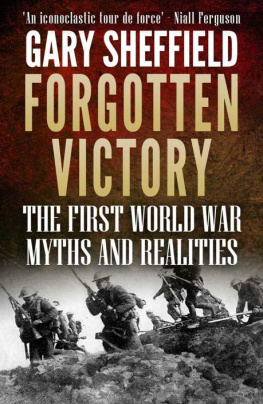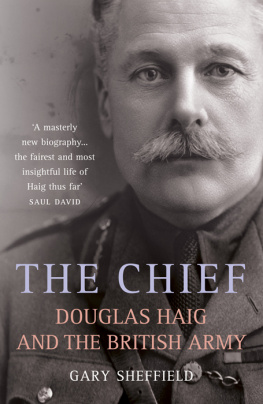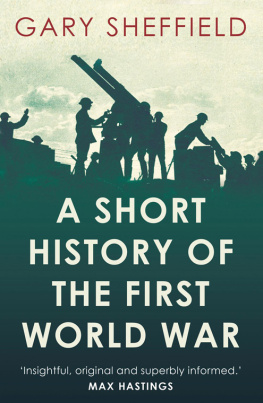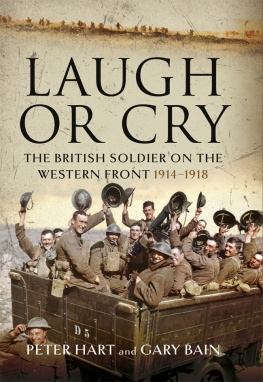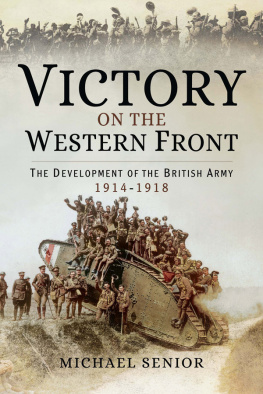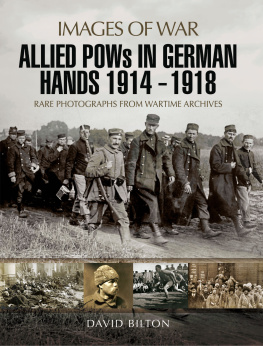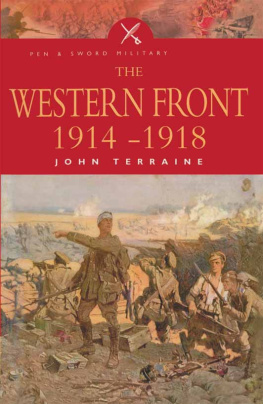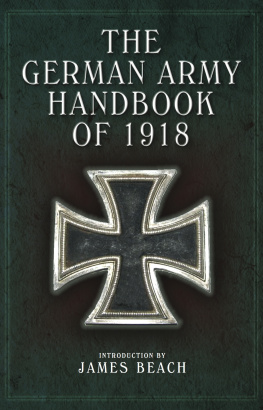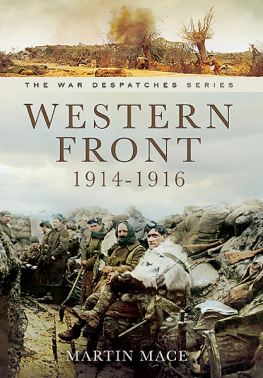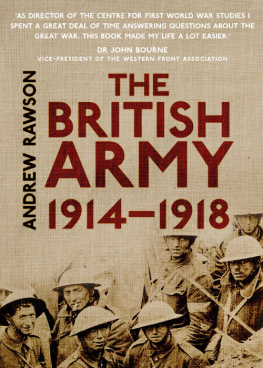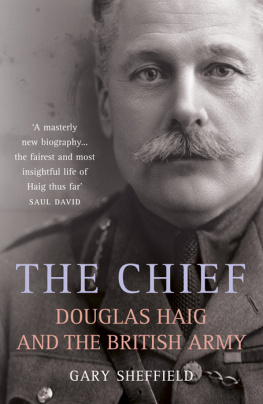To Roger Lee
First published in Great Britain in 2014 by
PRAETORIAN PRESS
An imprint of
Pen & Sword Books Ltd
47 Church Street
Barnsley
South Yorkshire
S70 2AS
Copyright Gary Sheffield, 2014
HARDBACK ISBN: 978-1-78159-021-8
PDF ISBN: 978-1-47383-642-6
EPUB ISBN: 978-1-47383-466-8
PRC ISBN: 978-1-47383-554-2
The right of Gary Sheffield to be identified as the author of this work has been
asserted by him in accordance with the Copyright, Designs and Patents Act 1988.
A CIP catalogue record for this book is available from the British Library.
All rights reserved. No part of this book may be reproduced or transmitted in
any form or by any means, electronic or mechanical including photocopying,
recording or by any information storage and retrieval system, without
permission from the Publisher in writing.
Typeset by Concept, Huddersfield, West Yorkshire, HD4 5JL.
Printed and bound in England by CPI Group (UK) Ltd, Croydon CR0 4YY.
Pen & Sword Books Ltd incorporates the imprints of Pen & Sword Archaeology,
Atlas, Aviation, Battleground, Discovery, Family History, History, Maritime,
Military, Naval, Politics, Railways, Select, Social History, Transport, True Crime,
and Claymore Press, Frontline Books, Leo Cooper, Praetorian Press,
Remember When, Seaforth Publishing and Wharncliffe.
For a complete list of Pen & Sword titles please contact
PEN & SWORD BOOKS LIMITED
47 Church Street, Barnsley, South Yorkshire, S70 2AS, England
E-mail:
Website: www.pen-and-sword.co.uk
Contents
, by Peter Simkins
List of Plates
Foreword
The last three decades have seen a remarkable transformation in First World War studies, our understanding of the military, political, social, economic and cultural aspects of the conflict having been greatly enhanced by a wealth of outstanding scholarship. Much work, of course, remains to be done, as perceptions of the war among the public at large appear to be still firmly, and frustratingly, wedded to the lions led by donkeys and butchers and bunglers interpretations of the struggle on the Western Front. For many, the images presented by Blackadder Goes Forth have a much more immediate impact than the writings of those who have undertaken countless hours of dedicated, archive-based research. There is no easy solution to this problem and possibly there never will be for, as Anthony Seldon and David Walsh remark in their stimulating recent book, Public Schools and the Great War: The Generation Lost (Pen & Sword, 2013), it is most commonly the emotion of the war and its suffering which deeply affect us, rather than the rational arguments of the historians.
That said, the labours of scholars at home and abroad since the early 1980s have certainly not been entirely in vain. As someone who has been a professional military historian for half a century, I can personally testify to the fact that, in general, a much more objective approach to the conflict is now more widely adopted than was the case fifty years ago. Centres of excellence in First World War studies have been established at various universities, and organisations such as the Western Front Association which was founded in 1980 and currently has over 6,000 members in some sixty branches in the United Kingdom and overseas seem to be flourishing. Moreover, in the scholarly community and among serious students of the 19141918 period, the historical debate in Britain and the Commonwealth about the nature and conduct of the war has at last moved on to a point at which most would acknowledge that the forces under Field Marshal Sir Douglas Haigs command in France and Belgium experienced a distinct and positive, if uneven, learning process and achieved major tactical and technological improvements between 1916 and 1918. It is perhaps worth observing in this connection, for example, that nearly all of the new biographies of Haig that have been published in the past ten years or so including Gary Sheffields own fine study, The Chief (2011) portray Haig not as the principal butcher or as a real-life General Melchett, but instead as a single-minded professional soldier with a profound sense of duty who, despite mistakes and setbacks, kept his head in the face of unprecedented challenges and presided over that very process of improvement that enabled the British Expeditionary Force to make a truly significant contribution to the ultimate Allied victory.
It is also worthy of note that Gary Sheffields emergence as a recognised world authority on the Great War has almost precisely coincided with this wider acceptance of the revisionist interpretation summarised briefly above. He can, indeed, justly claim to have played a key role in re-shaping our views of the 19141918 conflict. As the essays and papers which constitute this present volume clearly demonstrate, Professor Sheffield is more than capable of producing detailed operational and command studies on the one hand and illuminating strategic and historiographical overviews on the other. His chapters here on the difficult and demanding topics of morale, discipline and officer-man relations are equally perceptive and penetrating. On reading these essays again over twenty years since their initial publication in some cases I am particularly struck by the maturity of the earlier pieces. As a young scholar, Gary Sheffield undeniably hit the ground running to an astonishing degree and he has more than matched those same high standards of scholarship ever since. The formidable breadth of his reading and his prodigious capacity for research, writing and presenting international conference papers are all reflected in this book.
As Professor Sheffield himself indicates in his Preface, I have a personal connection with some of the chapters in this volume. Gary and I first met when, as an eager young undergraduate, he came to the Imperial War Museum to seek advice about potential areas of research, and the availability of sources, relating to Kitcheners Army. I remember steering him towards a study of the 22nd Royal Fusiliers the Kensington battalion a topic which Gary later broadened into an MA dissertation for which I subsequently acted as his external examiner. During the same decade he became my successor as Secretary-General of the British Commission for Military History. In 1997 he was a valuable member of the team which I was allowed to select to represent this country at a joint Anglo-Australian historical conference held in both London and Canberra. The fourth chapter in the book, on the Australian performance at Pozires in 1916, was originally presented at that conference. In more recent years, we have both been associated with the MA programme in British First World War studies at the University of Birmingham. I have therefore maintained a close almost paternal interest in Gary Sheffields career as an historian ever since that first meeting in the Reading Room of the IWM in the early 1980s. I feel privileged to be his friend and colleague and to have played some tiny part in his development as one of the leading, and most popular, scholars in his field.
Peter Simkins
December 2013
Preface
The origins of this book lie in the idea, which has been on my mind for some while, that I should bring together in one place some of the articles and book chapters on the First World War that I have written over the years. 2014, the centenary of the outbreak of the war, seemed an appropriate year to publish it. The oldest piece dates back to 1986, and is based on some postgraduate work I completed in 1984, while the newest was written especially for this book. So, Command and Morale consists of a series of snapshots of research spanning an academic career of, at the time of writing, almost thirty years.


